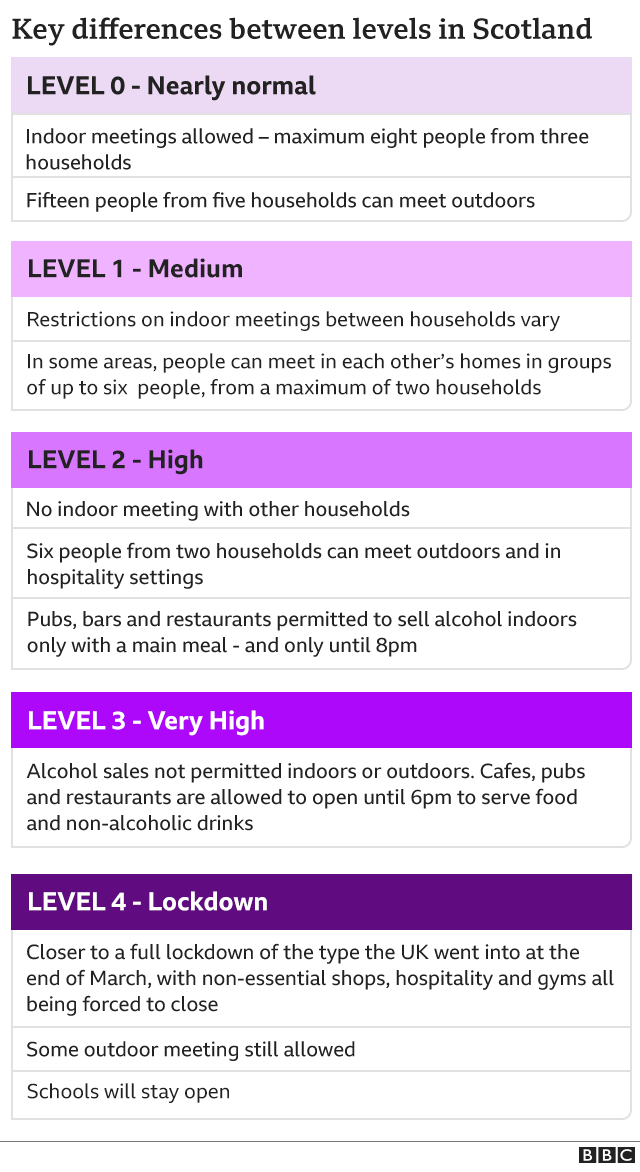Covid: Level 4 lockdown 'possible' in west of Scotland
- Published
- comments
Covid in Scotland: Level 4 'under consideration' in the west
Areas in the west of Scotland have been warned they may be placed under the highest level of Covid restrictions next week.
Deputy First Minister John Swinney said contact had been made with councils in the Greater Glasgow and Clyde and Lanarkshire health board areas.
They were told it was possible that restrictions may need to be increased from level three to level four.
The move would see the closure of gyms, hospitality and non-essential shops.
A Scottish retail trade association said it was "deeply alarmed" by the prospect of shops having to shut during the festive season.
The Scottish government confirmed on Friday evening it had made contact with every council in the Greater Glasgow and Clyde area - in most cases at chief executive level - to discuss the current situation.
The chief executives of both North and South Lanarkshire Councils were also called.
A spokeswoman said: "Scottish government officials make regular contact with all local authorities to discuss plans for protection measures before these are finalised."
Mr Swinney said increases in Covid cases had also been seen in other areas, including Stirling, which is also currently in level three, and Aberdeenshire, which is in level two.
He said the national incident management team would be looking at the data over the weekend.
Discussions will also take place with councils before ministers meet on Tuesday to take any decisions.
Mr Swinney added that there were "wider issues" which would also need to be considered, such as the social and economic harm which could be caused by moving an area into level four.
The highest level of coronavirus restrictions is the closest to a full lockdown, similar to the one introduced in March.

The guidelines say it will only be used if "absolutely necessary", at a time when cases are very high and there is a risk of the NHS being overwhelmed.
In response to the announcement, Scotland's largest teaching union, the EIS, called for the implementation of blended learning in areas which move into level four, amid concerns about school safety.
The union said the growing number of pupils and teachers infected with Covid-19 raised issues over the effectiveness of virus mitigations in schools.
The Scottish Retail Consortium said jobs would be lost if shops cannot trade during the festive season, which many rely on to boost winter sales.
Director David Lonsdale said: "It's already been an especially gloomy year for retail - but shop closures prior to Christmas would take us even deeper into the darkness."
'Encouraging compliance'
Several councils confirmed they were in talks over the level 4 move.
A spokesperson for North Lanarkshire said: "The council continues to engage with the Scottish government on the most appropriate level for North Lanarkshire to be in and we are actively encouraging residents to continue to comply with national guidance."
South Lanarkshire said it was in "constructive dialogue" with the Scottish government and East Renfrewshire also said discussions were continuing.

The EIS union has called for the re-introduction of blended learning in level 4 areas
A Renfrewshire Council spokeswoman said: "Scottish government have contacted us, and we are in discussion with them. No decision has been taken and Renfrewshire remains in level three at present.
"The council is committed to doing everything possible to help keep Renfrewshire communities out of further restrictions and local businesses open. We are asking all of Renfrewshire to work together to stop transmission of this virus, keep our communities safe and protect local jobs."
'Stubbornly high'
At the government's daily coronavirus briefing, Mr Swinney said: "I can confirm that officials in the Scottish government have been in contact with a number of local authorities in the west of Scotland about the possibility of the area having to be increased from level three to level four.
He added that a number of other local authorities around the country had been contacted because they had seen "quite significant" increases in rates of the virus.
Mr Swinney added that the numbers were "so stubbornly high" in some level three areas that it raised a question of whether the restrictions were doing enough to suppress the virus.
Mr Swinney added that if any area was moved into level four, this would need to be for "a reasonable amount of time" so that the effect of the restrictions could be seen.

